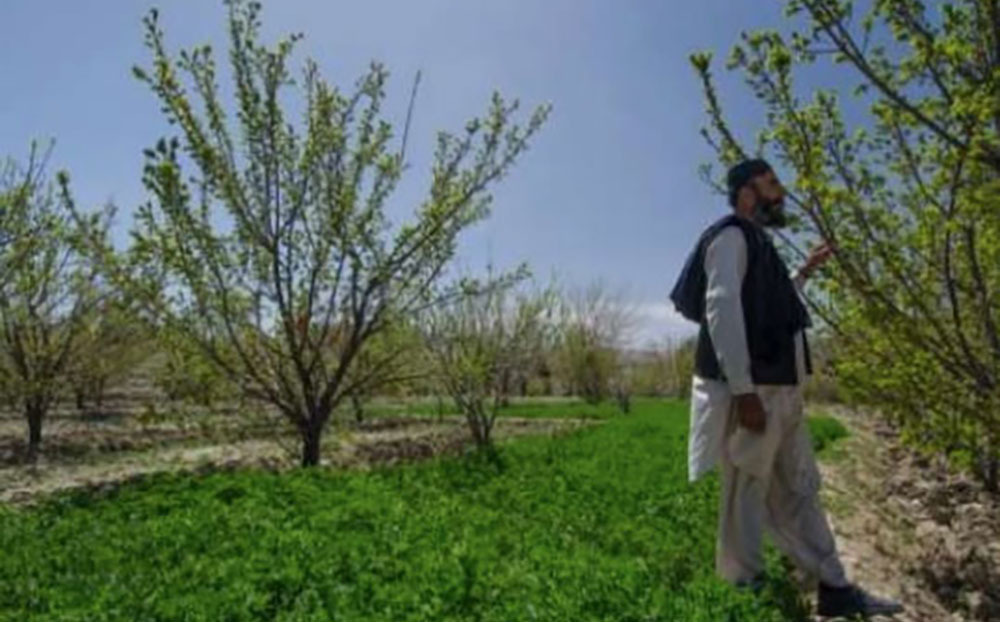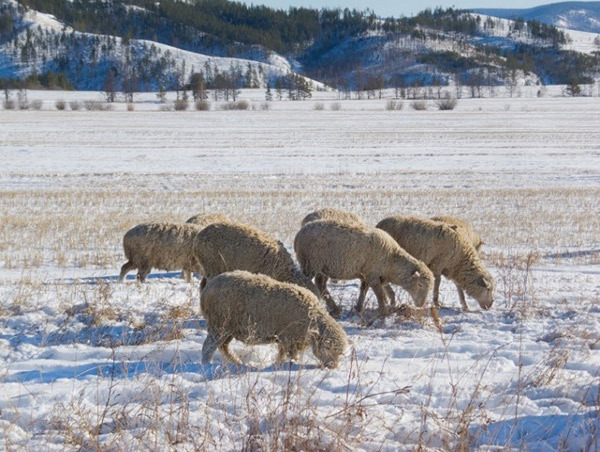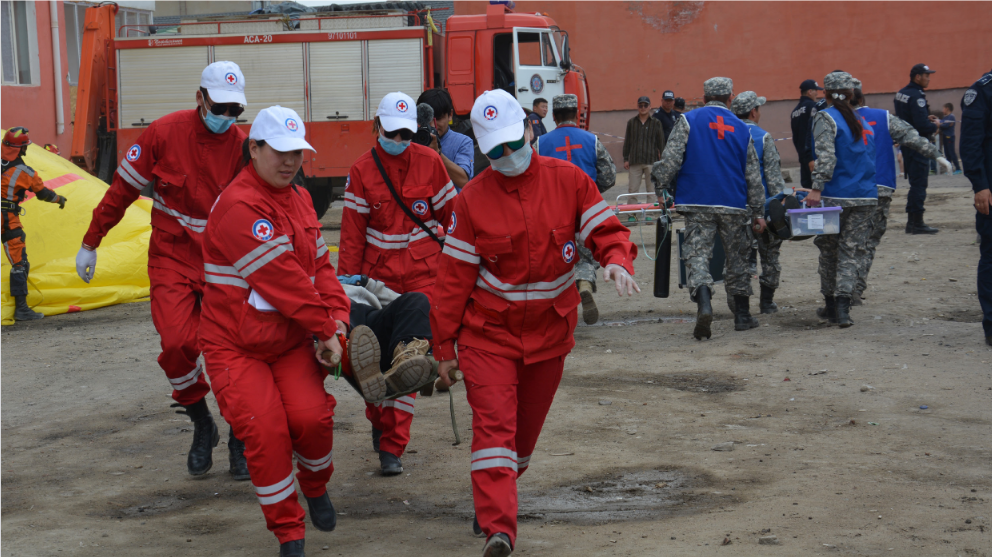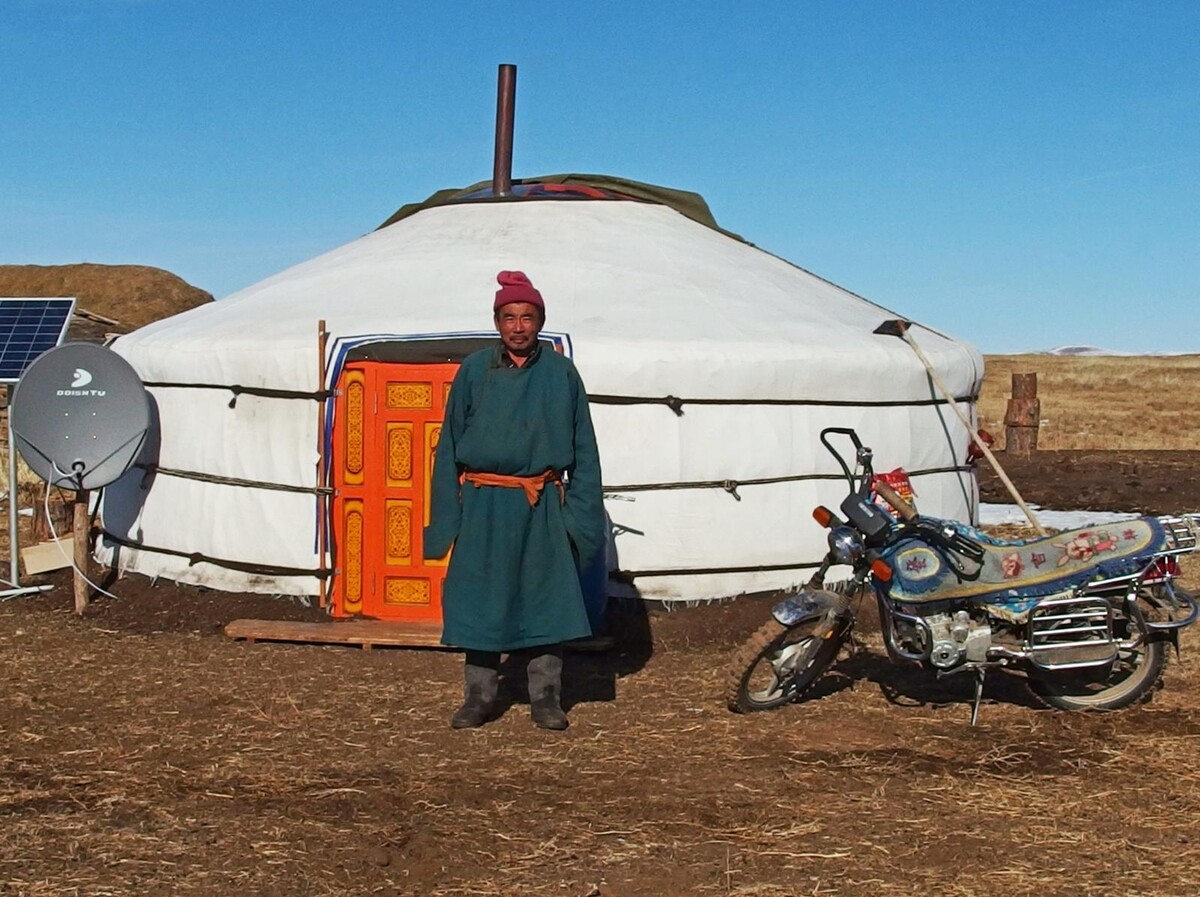
©FAO/D.Hadrill
Issue
Mongolia’s climate has hot summers and harsh winters. Particularly harsh winters, called dzud winters, result in frozen ground buried under deep snow, preventing livestock such as goats, sheep, and cows from reaching pasture for grazing. Vulnerable herding households can’t afford resources to feed their livestock without pastures, leading to the animals’ starvation.
The frequency and intensity of dzud winters are increasing due to climate change. Increasingly hot summers also result in poor grazing, so the livestock don’t have sufficient fat stores heading into the winter. Overgrazing has also increased as the economy transitions to a free market system.
Solution
The FAO Anticipatory Actionsystem implements, proactive activities, such as destocking-for-cash, distributing livestock feed, and offering animal health supplements(fish oil and salt licks), to prevent livestock loss during climate-induced dzud winters and lessen the burden to vulnerable herding households. As shown in the winter of 2017–2018 interventions, this system aims to prevent the compounding of risks that endanger livelihoods
Overview
In Mongolia, the UN FAO’s Anticipatory Action system addresses climate-related natural and humanitarian crises before significant impacts occur. This proactive approach aims to mitigate harsh winters’ adverse effects on livestock and livelihoods, applying anticipatory action and distributing aid. In the winter of 2017–2018, FAO effectively used this approach on vulnerable herding households in Mongolia, yielding valuable insights into the early action process.
Details
Harsh winters in Mongolia can decimate the livelihood of herding households that depend on pastures to sustain their livestock. Increasingly severe winters combined with economic changes and urban migration exacerbate the issue. Anticipatory measures are necessary to reduce impacts to local communities. The Anticipatory Action system by the Food and Agriculture Organization of the United Nations (FAO) provides optimism in the face of these challenges. The FAO Mongolia Country Office worked with the Government of Mongolia and the Mongolian Red Cross Society to implement Anticipatory Action.
The Anticipatory Action approach in Mongolia incorporates livestock management and resource distribution practices to enhance resilience to harsh winters. Its preemptive actions – such as destocking-for-cash, or reducing the amount of livestock held – help prevent loss of livestock and provide income for other necessities. Anticipatory Action actively engages local communities in decision-making and capacity-building, addressing immediate risks while bolstering long-term resilience.
Hot summers, harsh winters, and preparations
During the 2017 summer-to-fall season in Mongolia, several warning signs pointed to a particularly cold winter that would threaten the lives of many livestock. One assessment found that 80% of Mongolia was experiencing very hot weather with drought, preventing livestock from adequate grazing to build up fat stores for the winter.
Wheat production was down 30% to 70%, and heavy rains damaged the remaining harvest. The milk price was down 20% to 30%, negatively impacting the income of herding households that rely on the sales of milk their livestock produce. A mapping of pasture-carrying capacity reviewed by FAO found that the pastures could only support approximately half of the livestock in Mongolia, with most pastures being at least lightly overgrazed.
The Government of Mongolia released a dzud risk map, finding 30% of the country at a high risk of a severe dzud and another 30% at a medium risk. Another study narrowed down five areas under particularly severe threat, prompting FAO to act in the districts of Arkhangai, Bulgan, Zavkhan, Uvurkhangai, and Tuv. FAO set up an Anticipatory Action system to prepare for the impending dzud and began its intervention measures.
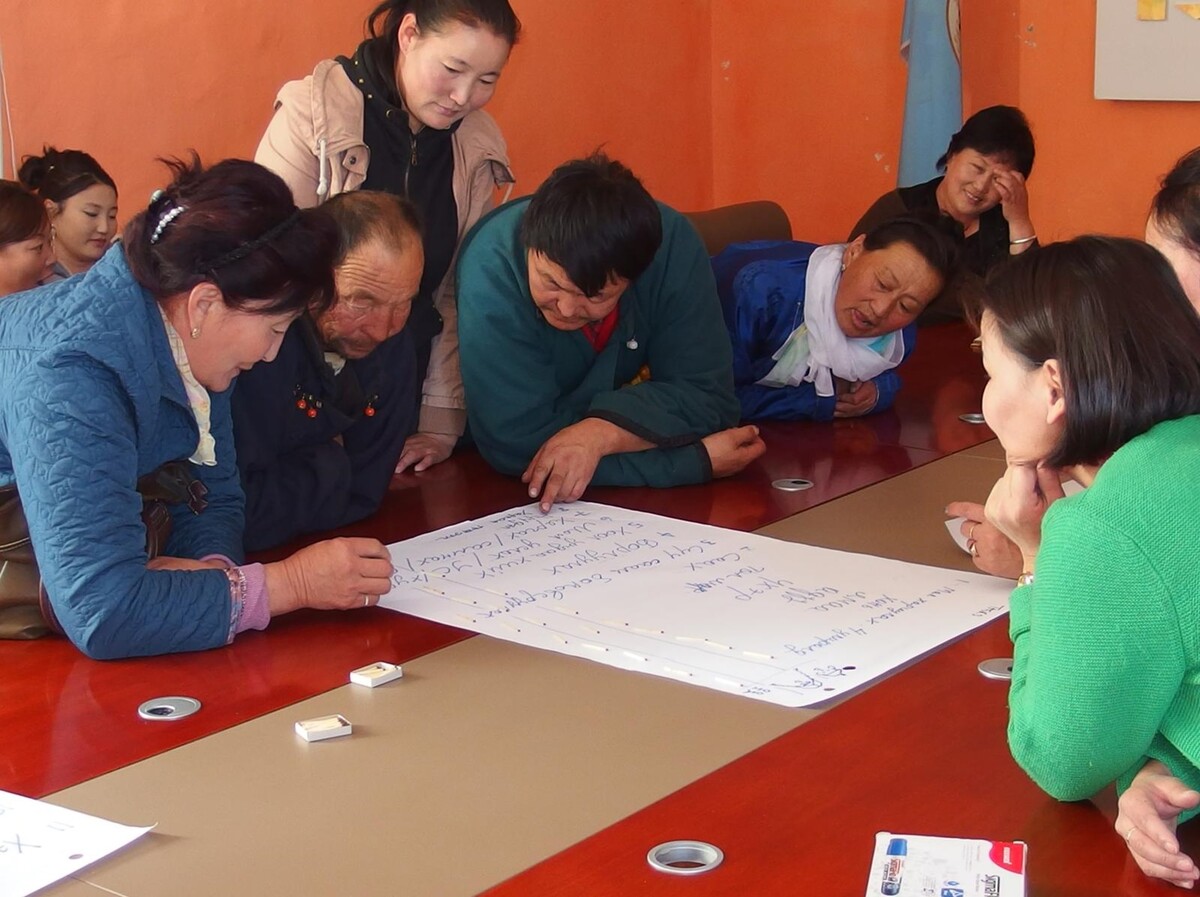
©FAO/D.Hadrill
Intervention in Mongolia
FAO’s intervention in Mongolia focused primarily on herd destocking-for-cash. Households received money in exchange for livestock carcasses in December 2017, which allowed herders to purchase extra sustenance for their families and other livestock ahead of spiking prices associated with the wintertime. Heightening the positive effects, the FAO distributed extra livestock meat to food-insecure households in urban areas.
FAO took additional intervention measures to ease the dzud winter’s cumulative impacts. It distributed livestock feed and supplements to particularly vulnerable herders and animals starting in 2018, preventing further livestock mortality during the lean season. Blankets, animal health equipment, and portable corrals were provided to keep animals warm and to avoid disease outbreaks.
FAO conducted an assessment to determine the intervention’s effectiveness. It found that for every US dollar spent on livestock interventions, a household benefitted US$7.1 through the value of the animals saved, loss of cashmere production avoided, extra milk produced, and drop in livestock value due to poor condition avoided. The timing of FAO’s interventions ahead of the dzud peak made this excellent return on investment possible.
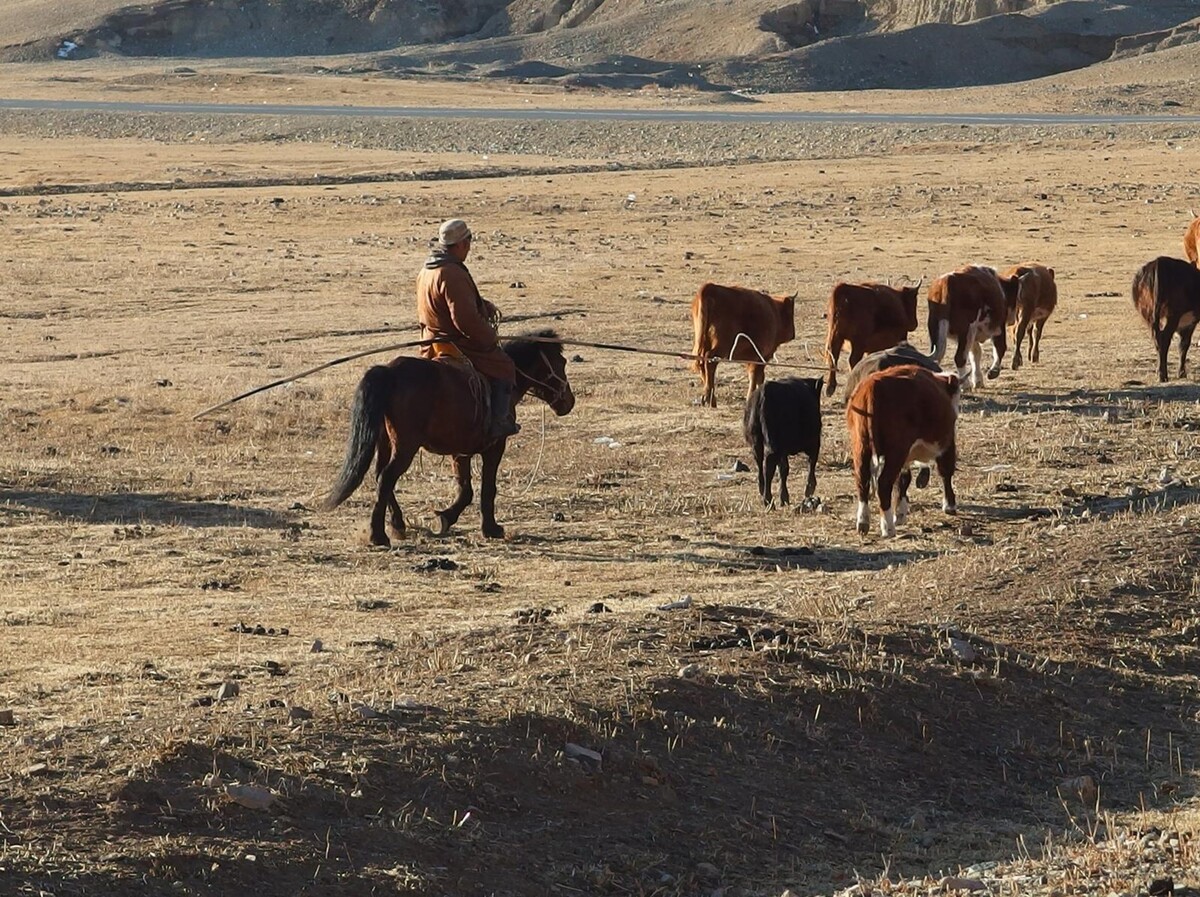
©FAO/D. Hadrill
Effect of Anticipatory Actions on Mongolian communities
The Anticipatory Action project in Mongolia had the added effect of positive benefits for the participants. Vulnerable herders who received meat from the destocking effort could save money and buy fuel, clothing, supplies, and medicines. Others were able to invest in small businesses with the extra money, potentially resulting in long-term returns and stability.
Maintaining livestock is an important cultural tradition in Mongolia. Livestock protection through these interventions helped to uphold the herders’ culture and generate future income through the livestock.
The Anticipatory Action project strongly emphasizes enhancing local stakeholders’ capabilities, ensuring the system’s benefits go beyond immediate mitigation during severe winters. Through empowering communities with knowledge and resources, the project establishes the groundwork for sustainable long-term development and improves food security. This approach demonstrates the effectiveness of Anticipatory Action in building resilience against climate-induced challenges, serving as a model for comparable initiatives in vulnerable regions around the world.
This pilot was key for moving to scale with the approach in future years. In late 2022/early 2023, FAO played a crucial role in supporting the Government of Mongolia as it employed Anticipatory Action, marking one of the pioneering instances of government resources being utilised for this purpose. In November 2022, the release of the dzud risk map indicated potential signs of an impending harsh winter in early 2023. Subsequently, the results of a fact-finding mission assessment prompted the State Emergency Commission, led by the Deputy Prime Minister, to initiate intensified mitigative efforts. Following a thorough review of the assessment results in meetings held in November and December 2022, the SEC recommended specific anticipatory actions. These recommendations were formally endorsed by the Cabinet of Ministers during its meeting on December 14, in accordance with the requirements of the Law on State Reserves (refer to Government Resolution 461/2022). Such recommendations and also been deployed during the 2023/24 dzud.
ACKNOWLEDGEMENTS
We extend our appreciation to the Food and Agriculture Organization of the United Nations (FAO) for their generous provision of this case study to the database.

